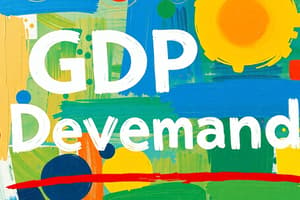Podcast
Questions and Answers
What is macroeconomics?
What is macroeconomics?
Macroeconomics focuses on the behavior and performance of large sectors within an economy.
Define GDP in macroeconomics.
Define GDP in macroeconomics.
GDP (Gross Domestic Product) measures all final goods and services produced within a country's borders during one year.
What is aggregate demand in macroeconomics?
What is aggregate demand in macroeconomics?
Aggregate demand is the sum total of consumers', businesses', governmental, and foreign buying.
Explain aggregate supply in macroeconomics.
Explain aggregate supply in macroeconomics.
What is the goal of macroeconomic policy?
What is the goal of macroeconomic policy?
Why is macroeconomics important for governments?
Why is macroeconomics important for governments?
What are some key subjects that fall under the realm of Macroeconomics?
What are some key subjects that fall under the realm of Macroeconomics?
Why does macroeconomic theory aim to explain changes in certain aspects?
Why does macroeconomic theory aim to explain changes in certain aspects?
What are some key indicators that macroeconomists often measure?
What are some key indicators that macroeconomists often measure?
Why do macroeconomists focus on measuring key indicators?
Why do macroeconomists focus on measuring key indicators?
What is the main focus of macroeconomic policies?
What is the main focus of macroeconomic policies?
How do macroeconomists explain phenomena like rapid expansion and stagnant growth?
How do macroeconomists explain phenomena like rapid expansion and stagnant growth?
What is the central element in managing the overall health of the economy?
What is the central element in managing the overall health of the economy?
What tools are used to boost investment or dampen down inflation in an economy?
What tools are used to boost investment or dampen down inflation in an economy?
What additional pressures can influence a country's economy in the international arena?
What additional pressures can influence a country's economy in the international arena?
What does Macroeconomics help us understand about the economy?
What does Macroeconomics help us understand about the economy?
How do policymakers gain valuable insights into where they need to take action to support prosperity and stability over time?
How do policymakers gain valuable insights into where they need to take action to support prosperity and stability over time?
What role do central banks play in managing economic performance?
What role do central banks play in managing economic performance?
Flashcards are hidden until you start studying
Study Notes
Economics is a broad field of study concerned with how people produce, distribute, and consume goods and services. One important aspect of economics is macroeconomics, which focuses specifically on the behavior and performance of large sectors within an economy such as national income, employment levels, interest rates, etc. Macroeconomics helps governments make decisions about taxes, spending, inflation, unemployment, and other economic issues that can affect everyone's financial wellbeing.
One key concept in macroeconomics is GDP (Gross Domestic Product), which measures all final goods and services produced within a country's borders during one year. It represents the total monetary value of output generated by labor and property located domestically. Another main category is aggregate demand—the sum total of consumers', businesses', governmental, and foreign buying, usually measured through the GNP (Gross National Product). A third major component is aggregate supply, which includes everything produced by domestic firms over a given time period.
The goal of macroeconomic policy is often to achieve a balance between growth and stability—ideally, it aims for low unemployment alongside stable prices and high productivity. This involves managing supply and demand simultaneously so they move along parallel lines of sustainable development. Governments may adjust their fiscal policies accordingly if certain imbalances arise due to changing circumstances like natural disasters or war. They might also implement various forms of direct taxation (income tax, corporate tax) depending upon prevailing conditions.
In summary, macroeconomics deals with the big picture view of economies rather than individual aspects, helping policymakers steer clear waters amidst turbulent times while fostering steady economic progress.
Studying That Suits You
Use AI to generate personalized quizzes and flashcards to suit your learning preferences.



